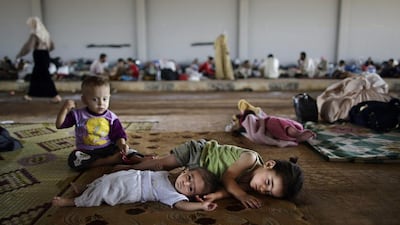The Syrian civil war has become a part of life, something normal to be accepted, in a way that no one could possibly have imagined when it began in 2011. The United Nations refugee agency now says that four million Syrians have fled abroad, in addition to 7.6 million who are displaced within their own country.
This week we learnt that the Obama administration’s flagship policy in Syria – to create a force of 5,400 fighters to march on Damascus – has managed to find only 60 men to train. That figure says all that anyone needs to know about the paralysis of western decision-making in a conflict where there are no good outcomes.
From time to time there is a flicker of excitement that the regime of president Bashar Al Assad may be weakening into terminal decline, but the truth is that the division of the country among warlords is solidifying. The regime seems likely to survive as the first among equals of the fighting factions and the only one with an air force, as long as Iran sees fit to support it.
As for the refugees, the exodus continues. They are no longer waiting on a political outcome that would end their exile. That could be years away. The idea that they should stay on the borders in Turkey, already home to two million Syrian refugees, or in Jordan or Lebanon to make a quick return is looking threadbare. Every year, more are giving up hope of going home.
Syrians are now the top nationality of asylum applications in Europe with 138,016 last year alone. The holiday season in the Greek islands is providing dramatic scenes of everyday life in the Aegean, where a comfortable continent bumps up against a region in distress.
While they relax on the sand, holidaymakers in Greece are shocked to be sharing their island paradises with destitute Syrian families washing their clothes in the sea. Some are horrified to see the wreckage of small boats and inflatables caught on the rocks, an uneasy reminder than many die trying to reach the islands to which they so comfortably fly.
With Greece on the brink of bankruptcy, the refugees get a rough and ready reception and those with money and physical strength try to head north to Germany and Sweden.
If this is now considered normal, how can the world be shaken awake? This is the task that the Britain-based Syrian artist Issam Kourbaj has taken on, for London’s Shubbak festival, an annual celebration of contemporary Arab culture. Mr Kourbaj is creating five installations across the capital titled Another Day Lost to give an indication of the scale – in geography and time – of the tragedy.
The installations are makeshift “camps” constructed out of medicine packaging and books, all with a black line that recalls a mourning ribbon drawn across them. They are spread out across the city, to symbolise the location of the refugee camps on the borders of Syria. Each installation is surrounded by a “fence” of 1,593 spent matches, one for each “lost day” in the life of Syria since the uprising began.
Mr Kourbaj is a man of few words and sees himself as an artist, not an activist. Last year, he spoke of his pain at the destruction of his homeland.
To be reminded what the world is losing through this conflict is salutary. But the problem remains that the Syrian war is now a part of life, a factor which is taken into account in policy decisions, rather than a scourge to be confronted and eliminated.
This can be clearly seen in the current Greek debt crisis. The financial consensus is that Greece, which represents only two per cent of the European Union economy, should never have joined the euro, the common currency, and it would not be a disaster if it dropped out. In fact, it would make the euro stronger.
But every European leader has an eye on a different priority: Greece may be small but it is Europe’s gatekeeper on the border with Turkey, where two million Syrian refugees are considering the chances of making a new life in the north. For that reason, no European leader wants Greece to go its own way.
The Greek government has played on this fear, with the defence minister, Panos Kammenos, warning that Europe has to keep Greece on its side. If it lets Greece go, he said, “waves of undocumented migrants, including radical elements, will spill in from Turkey, making their way to the heart of the West”. And by the heart of the west, he means Germany.
For all the artist’s focus on civilisation, European governments see the Syria crisis as an issue of terrorism and immigration, two hot political issues that drown out measured debate. No art is likely to stop the war but it might soften British official hearts when it comes to taking in Syrian refugees.
So far more than half of the Syrian refugees accepted in Europe have gone to the traditionally welcoming countries of Germany and Sweden, which have taken 43,000 and 38,000, respectively. For Britain, the figure is 4,000, in addition to its own special resettlement programme, which has benefited a mere 187. British generosity is not in doubt – official humanitarian aid is more than $1 billion.
But the refugee families need homes and their children need education. As long as the international community has no effective plan to end the war, then the humanitarian imperative must step in. Millions cannot stay forever in Mr Kourbaj’s black lined camps counting the lengthening tally of lost days.
Alan Philps is a commentator on global affairs
On Twitter @aphilps

